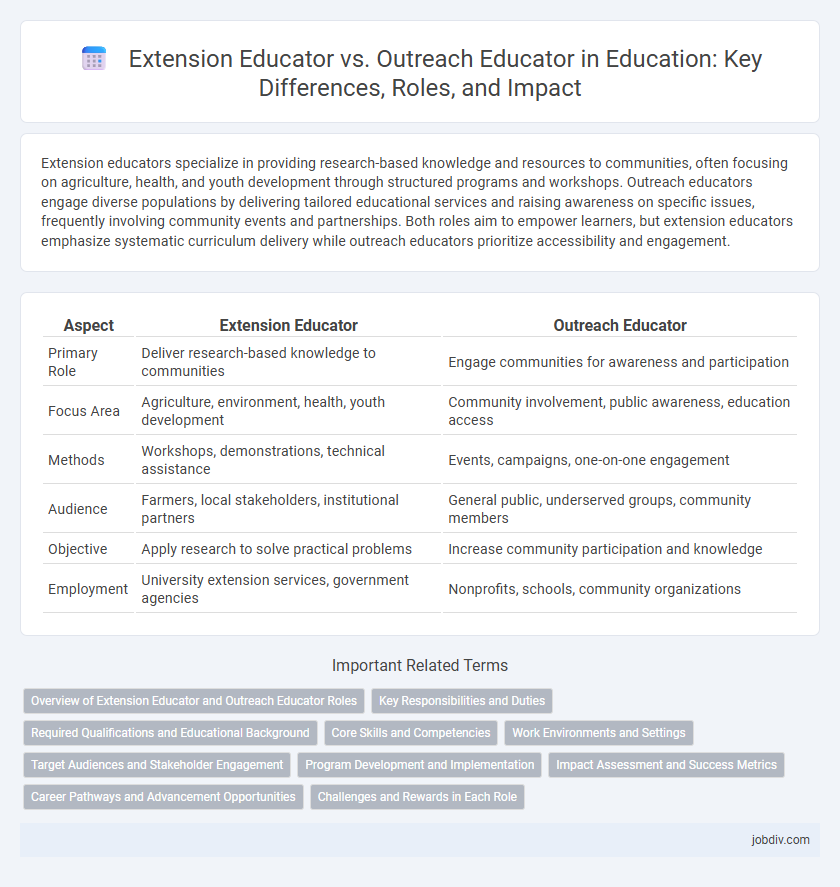Extension educators specialize in providing research-based knowledge and resources to communities, often focusing on agriculture, health, and youth development through structured programs and workshops. Outreach educators engage diverse populations by delivering tailored educational services and raising awareness on specific issues, frequently involving community events and partnerships. Both roles aim to empower learners, but extension educators emphasize systematic curriculum delivery while outreach educators prioritize accessibility and engagement.
Table of Comparison
| Aspect | Extension Educator | Outreach Educator |
|---|---|---|
| Primary Role | Deliver research-based knowledge to communities | Engage communities for awareness and participation |
| Focus Area | Agriculture, environment, health, youth development | Community involvement, public awareness, education access |
| Methods | Workshops, demonstrations, technical assistance | Events, campaigns, one-on-one engagement |
| Audience | Farmers, local stakeholders, institutional partners | General public, underserved groups, community members |
| Objective | Apply research to solve practical problems | Increase community participation and knowledge |
| Employment | University extension services, government agencies | Nonprofits, schools, community organizations |
Overview of Extension Educator and Outreach Educator Roles
Extension Educators deliver research-based knowledge and practical skills to communities, often through agricultural programs, health initiatives, and youth development, focusing on applying university research to local needs. Outreach Educators primarily engage in promoting awareness and providing educational resources to diverse audiences on topics such as public health, environmental issues, or social services, emphasizing community engagement and access. Both roles aim to empower individuals through education, but Extension Educators typically have deeper ties to academic institutions, while Outreach Educators often operate within government agencies or nonprofits.
Key Responsibilities and Duties
Extension Educators primarily focus on delivering research-based educational programs to agricultural producers, families, and youth, facilitating community development and sustainable practices through hands-on workshops and resource distribution. Outreach Educators engage broader audiences by raising awareness, providing informational sessions, and connecting underserved populations with essential services in health, education, and social support. Both roles require strong communication skills, partnership building, and program evaluation to effectively address community needs and promote lifelong learning.
Required Qualifications and Educational Background
Extension Educators typically require a bachelor's or master's degree in fields such as agriculture, education, or community development, often combined with practical experience in community-based programs. Outreach Educators usually hold degrees in social work, public health, or communications, emphasizing skills in engagement and resource coordination to effectively reach diverse populations. Both roles demand strong interpersonal abilities, but Extension Educators focus more on technical expertise, while Outreach Educators prioritize cultural competency and community interaction.
Core Skills and Competencies
Extension Educators specialize in delivering research-based knowledge directly to communities, emphasizing skills in program development, adult education, and applied research. Outreach Educators focus on raising awareness and engaging diverse audiences through communication, marketing, and advocacy strategies. Both roles require strong interpersonal skills, cultural competency, and the ability to evaluate program impact for continuous improvement.
Work Environments and Settings
Extension Educators typically operate within university-affiliated programs or community centers, delivering research-based knowledge and resources to rural and agricultural communities. Outreach Educators often work in diverse urban environments such as schools, nonprofit organizations, and healthcare facilities, focusing on raising awareness and providing education to underserved or specialized populations. Both roles require adaptability to varied settings but differ in institutional affiliation and target audience engagement strategies.
Target Audiences and Stakeholder Engagement
Extension Educators primarily serve rural communities, farmers, and agricultural stakeholders, focusing on practical skills and applied research to enhance local farming practices and community development. Outreach Educators engage diverse urban and suburban populations, tailoring programs to meet broader educational needs such as public health, youth development, and environmental awareness. Both roles emphasize stakeholder engagement through collaborative partnerships, but Extension Educators often work directly with cooperative extension systems, while Outreach Educators partner with schools, nonprofits, and government agencies for wider community impact.
Program Development and Implementation
Extension Educators specialize in developing and implementing community-based programs tailored to local needs through research-driven curricula and hands-on workshops, ensuring practical knowledge application. Outreach Educators focus on delivering educational content by engaging diverse audiences through various communication channels, emphasizing accessibility and audience-specific adaptation. Both roles require strategic planning and collaboration with stakeholders to maximize program impact and sustainability.
Impact Assessment and Success Metrics
Extension educators utilize community-based programs to deliver research-backed agricultural and environmental education, measuring impact through long-term behavioral changes and regional economic benefits. Outreach educators focus on broad dissemination of information across diverse audiences, assessing success via participation rates, engagement metrics, and immediate knowledge retention. Both roles emphasize data-driven evaluation but differ in scope, with Extension educators prioritizing sustained community development and Outreach educators targeting outreach efficiency.
Career Pathways and Advancement Opportunities
Extension Educators typically advance through roles within agricultural universities or government extension services, gaining expertise in community-based program development and grant management. Outreach Educators often progress in nonprofit organizations or public health sectors, specializing in direct community engagement and education on social issues. Career pathways for both roles include leadership positions, program coordination, and policy advocacy, with advancement opportunities influenced by sector-specific skills and networking.
Challenges and Rewards in Each Role
Extension Educators often face challenges such as limited funding and balancing academic research with community needs, but they gain rewards through direct impact on agricultural and rural development. Outreach Educators encounter difficulties including diverse audience engagement and resource constraints, yet they are rewarded by fostering community empowerment and enhancing public access to educational programs. Both roles demand adaptability and strong communication skills, with success measured by improved knowledge dissemination and community outcomes.
Extension Educator vs Outreach Educator Infographic

 jobdiv.com
jobdiv.com